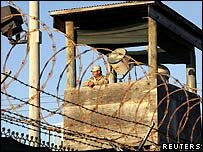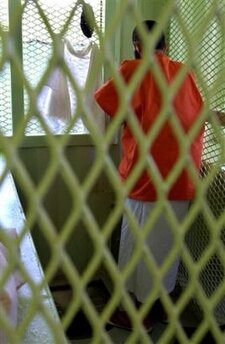The US defence department has for the first time put the names of detainees to transcripts of tribunals at Guantanamo Bay.

It could take weeks for the documents to be fully analysed
|
But the 6,000 pages of documents released under the Freedom of Information Act do not always name the person attending the tribunal. Many as listed as "detainee".
It is not always clear who has been released and who is still held and it could take weeks for the documents to be fully analysed.
Here is some of the named evidence given at hearings:
FEROZ ALI ABASSI
Briton who submitted written complaints that military police had sex in front of him as he prayed. Said other guards tried to feed him a "hot plate of pork", which is forbidden in Islam. Said he was misled into praying north, towards the US, rather than Mecca.
Repeatedly cited his rights to be called a prisoner-of-war under international law. Was told by a US colonel: "I do not care about international law. I do not want to hear the words international law again."
QARI ESMHATULLA
Captured in US Operation Anaconda in eastern Afghanistan in March 2002. Admitted carrying grenades and a radio to Taleban fighters. Said he did so because other villagers asked him why he was sitting at home as others fought the US.
In Pashtun culture, he said: "It is a bad thing if you do not accept a challenge." Said his enemy was not the US but "Farsi-speaking people who have differences with the Pashtu-speaking people".
ABDUL HAKIM BUKHARY
Said he was jailed by the Taleban as he was suspected of being a spy after admitting admiration for anti-Taleban warlord Ahmed Shah Massood.
 |
 They give us three meals. Fruit juice and everything! They give us three meals. Fruit juice and everything! 
|
Said of conditions in Guantanamo Bay: "Prisoners here are in paradise. American people are very good. Really. They give us three meals. Fruit juice and everything!" Still wanted to go back to his family, though, he said.
MOHAMMED SHARIF
Denied being a Taleban camp guard. Said the Taleban had captured him and ordered him to work. He complied, fearing attacks on his family. Repeatedly asked for evidence to be brought against him. "There are no facts... this is ridiculous. I know for a fact there is no proof."
ABDUL GAPPHER
An ethnic Chinese Uighur said he was in Afghanistan to "get some training to fight back against the Chinese government". Said he had no quarrel with the US. Said he had been captured in Pakistan and "sold" to the US government. Said the Chinese government was torturing his people and his family.
ZAHIR SHAH
Said he had rifles in his house as protection for a running feud with his cousin. Said he did not fight US troops. Denied accusation of owning rocket-propelled grenade launcher. "What are we going to do with RPGs? The only thing I did in Afghanistan was farming... We grew wheat, corn, vegetables and watermelons."
SAIFULLAH PARACHA
Sent to Guantanamo Bay after arrest in Thailand. Multi-millionaire businessman and New York Institute of Technology graduate. Admitted meeting Osama Bin Laden twice in Pakistan.
Denied investing for al-Qaeda, translating for Bin Laden and plotting to bring explosives into the US. Was told he will be allowed to take his case through US courts. "I've been here 17 months - would that be before I expire?" he asked.
MESH ARSAD AL-RASHID
Said he went to Afghanistan to fight warlord Abdul Rashid Dostum and the late Ahmed Shah Massood in the north. "I did not know my training would be considered al-Qaeda training. I was trying to help Muslims," he said. "I am not from the Taleban, I'm just a person, a helper. I was going to fight against Dostum."
OTHER TESTIMONY
Unnamed detainee noted three panellists were US military members. "The US military is my adversary... If the adversary is my judge... I should not expect any justice." The tribunal head said: "This proceeding is going to go on with or without you. You are welcome to participate or not."
Documents said Mishal Awad Sayaf Alhabri attempted suicide, "resulting in significant brain injury due to oxygen loss". Report said: "He will need to be in some assisted-living situation, though he can follow simple concrete directions."
Documents said Sofiane Haderbache "stood in his cell naked" in defiance of guards. "Detainee's recorded behaviour, medication history and utilisation pattern of psychiatric services suggest this detainee is regressing."
- Click Here for Guantanamo Bay Information
|


 New York Times News Service. This article was reported by Margot Williams, Tim Golden and Raymond Bonner, and was written by Golden. Tom Torok contributed reporting
New York Times News Service. This article was reported by Margot Williams, Tim Golden and Raymond Bonner, and was written by Golden. Tom Torok contributed reporting



